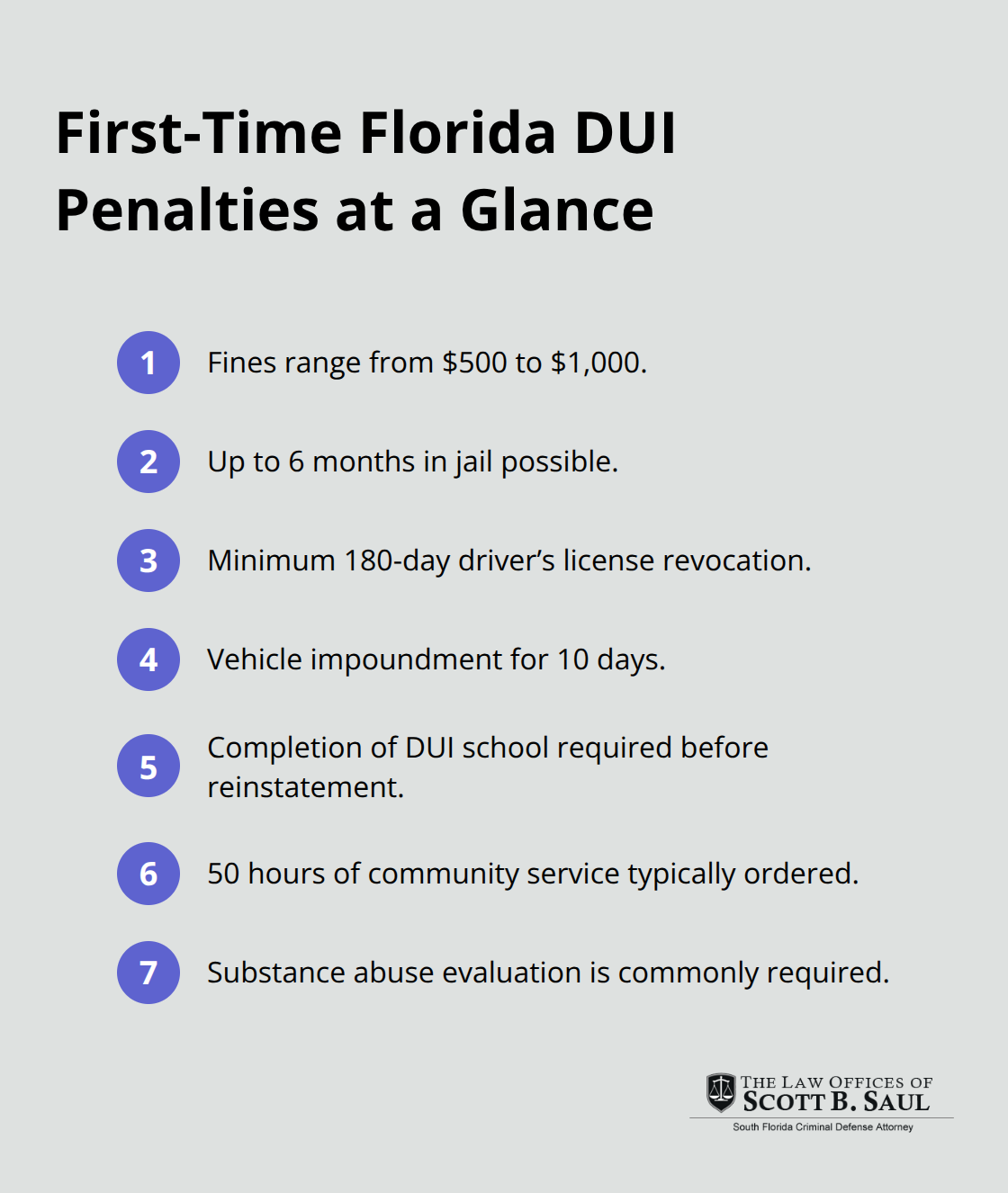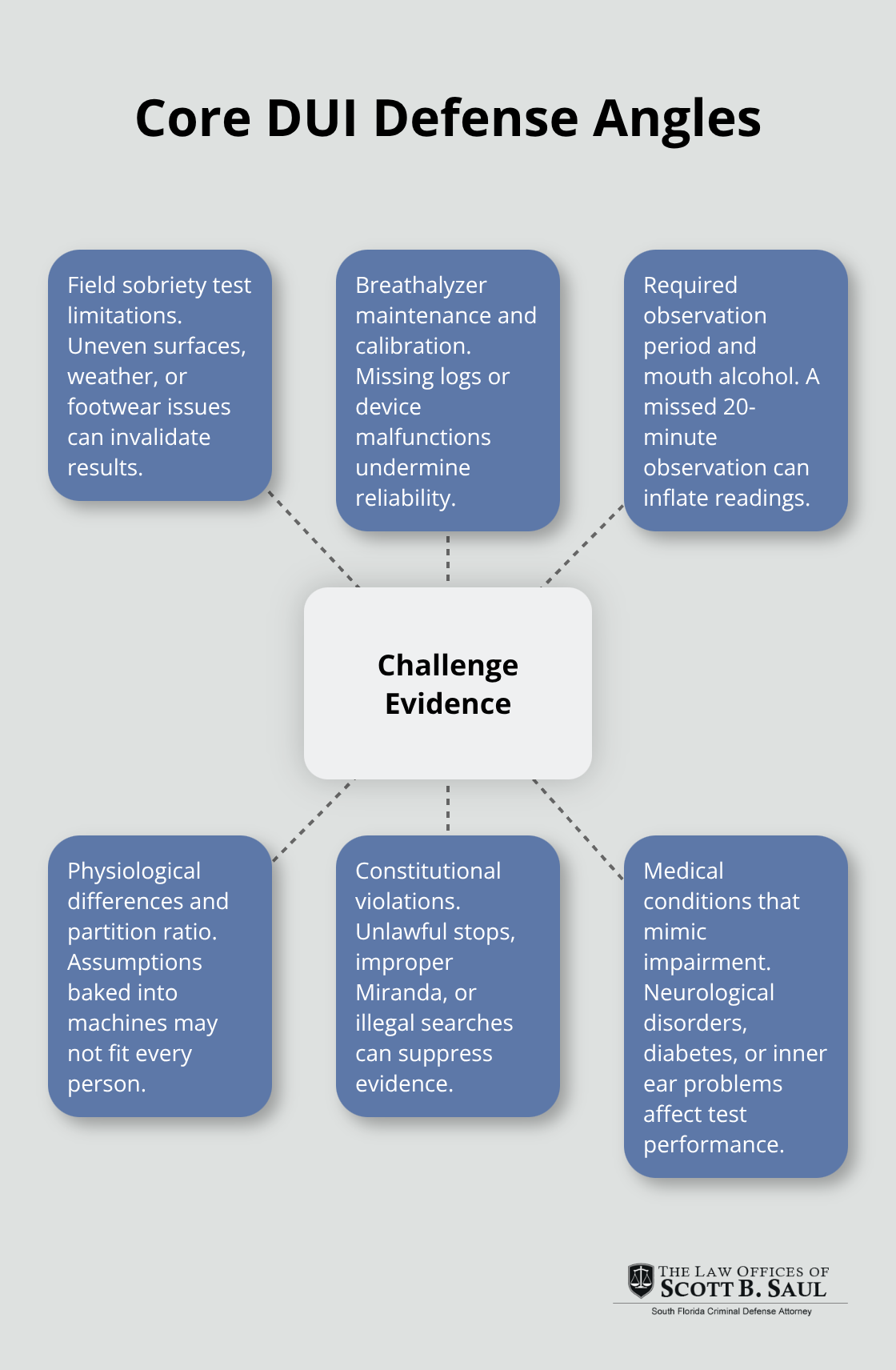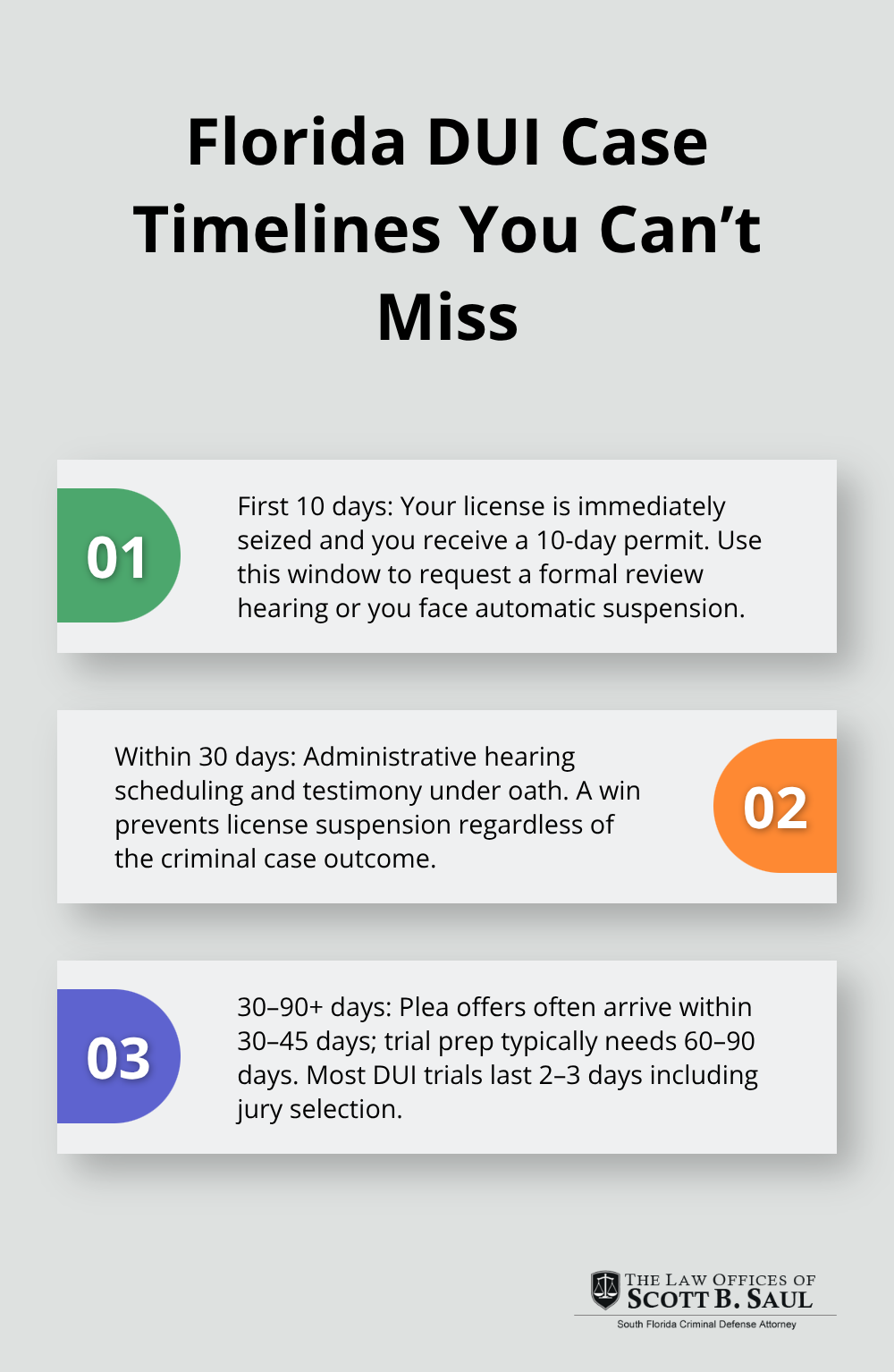Florida DUI Laws Explained [2025 Guide]
By : saulcrim | Category : Criminal Defense | Comments Off on Florida DUI Laws Explained [2025 Guide]
17th Nov 2025

Florida DUI laws carry severe penalties that can impact your life for years. Understanding these regulations and your rights is essential when facing charges.
We at Law Offices of Scott B. Saul have defended countless clients against DUI accusations throughout Florida. This guide breaks down everything you need to know about penalties, defense strategies, and the court process.
What Are Florida’s DUI Penalties and BAC Limits?
Blood Alcohol Content and Testing Standards
Florida sets the legal blood alcohol content limit at 0.08% for drivers 21 and older. Commercial drivers face a stricter 0.04% threshold, while drivers under 21 cannot exceed 0.02%. Police can arrest you for DUI even below these limits if alcohol or drugs impair your normal faculties.
Florida Statute 316.193 allows officers to request breath, blood, or urine tests during DUI stops. Test refusal triggers automatic license suspension – one year for first refusal, 18 months for subsequent refusals. Under Trenton’s Law (enacted October 1, 2025), test refusal now carries criminal charges: second-degree misdemeanor for first refusal and first-degree misdemeanor for repeat refusal.
First-Time DUI Penalties
First-time DUI offenders face fines between $500-$1,000, up to six months jail time, and 180-day minimum license revocation. Courts impose vehicle impoundment for 10 days and require completion of DUI school before license reinstatement. Probation typically includes 50 hours of community service and substance abuse evaluation.

Enhanced penalties apply when BAC reaches 0.15% or higher, which increases first-offense fines to $2,000 and extends jail time to nine months. The presence of minors in the vehicle also triggers enhanced penalties regardless of BAC level.
Repeat Offense Consequences
Second convictions within five years require minimum 10 days jail and fines of $1,000-$2,000. Courts extend vehicle impoundment to 30 days and mandate ignition interlock device installation. Third DUI offenses within 10 years become third-degree felonies with 30-day minimum jail sentences and fines up to $5,000.
As of 2024, about 5.09 drunk drivers out of 100,000 licensed drivers are involved in fatal DUI accidents. Fourth DUI convictions result in permanent license revocation and felony charges that carry up to five years imprisonment.
Aggravated DUI and Manslaughter Charges
DUI manslaughter carries up to 15 years imprisonment under standard penalties. However, Trenton’s Law now makes second DUI manslaughter convictions first-degree felonies with 30-year maximum sentences. Judges also possess authority to permanently revoke licenses for vehicular homicide convictions.
Property damage or injury cases escalate charges to first-degree misdemeanors or third-degree felonies respectively. These enhanced charges significantly complicate defense strategies and require immediate legal intervention to protect your rights and explore all available defense options.
How Can You Challenge Florida DUI Evidence?
Field Sobriety Test Reliability Issues
Field sobriety tests are tools to assist officers in seeing visible signs of impairment and are not pass/fail tests according to National Highway Traffic Safety Administration studies. The Horizontal Gaze Nystagmus test cannot account for medical conditions like inner ear problems, brain injuries, or certain medications that cause eye movement irregularities. Walk-and-turn tests become invalid when officers conduct them on uneven surfaces, in poor weather, or with suspects who wear inappropriate footwear.

Officers frequently fail to follow standardized procedures, which makes test results inadmissible in court. Medical conditions significantly impact test performance – diabetes, hypoglycemia, and neurological disorders can mimic intoxication symptoms. Age, weight, and physical disabilities also affect balance and coordination tests. Defense attorneys successfully challenge these tests when officers fail to ask about medical conditions or ignore obvious physical limitations.
Breathalyzer Machine Problems
Florida uses Intoxilyzer 8000 machines that require regular calibration and maintenance logs for accuracy verification. Machine malfunctions occur frequently – Miami-Dade County reported over 200 breathalyzer failures in 2023 alone. Temperature fluctuations, radio frequency interference, and improper maintenance protocols can produce false readings.
Machines must complete diagnostic checks before officers conduct tests, and any failure invalidates results. Mouth alcohol from dental work, acid reflux, or recent alcohol consumption can artificially inflate readings. Officers must observe suspects for 20 minutes before tests to eliminate this contamination, yet many fail to follow this protocol. Blood partition ratio assumptions built into machines don’t account for individual physiological differences (creating another avenue for challenge evidence).
Constitutional Rights Violations
Traffic stops require reasonable suspicion of criminal activity or traffic violations. Officers cannot extend stops beyond their original purpose without additional justification. Improper Miranda warnings, coercive interrogation techniques, or denial of attorney access violate constitutional rights and can result in evidence suppression. Police must have probable cause for arrest, not just suspicion of impairment.
Illegal searches of vehicles or persons without consent or warrants violate Fourth Amendment protections. Officers often exceed their authority when they search without proper justification or conduct field tests without established protocols. These violations provide strong grounds for case dismissal when attorneys properly identify and challenge unlawful searches and seizures through pretrial motions.
Understanding these defense strategies helps you recognize potential weaknesses in prosecution cases. The next phase involves understanding how Florida courts process DUI cases from arrest through final resolution.
What Happens After Your Florida DUI Arrest
Immediate Post-Arrest Timeline and Administrative Actions
Florida DUI cases follow two separate tracks that begin immediately after arrest. The criminal case starts with booking and typically reaches arraignment within 21 days, though Miami-Dade County averages 14 days due to higher court volumes. The administrative license suspension occurs automatically – officers confiscate your physical license and issue a temporary permit valid for 10 days.
This 10-day window represents your only opportunity to request a formal review hearing with the Department of Highway Safety and Motor Vehicles. Missing this deadline results in automatic suspension taking effect, which makes immediate legal action essential. Most defendants receive bond within 24 hours for standard DUI charges, though enhanced charges or repeat offenses can extend detention periods significantly.
License Suspension Hearings and Strategic Decisions
Administrative hearings operate independently from criminal proceedings and focus solely on whether officers had lawful basis for arrest and testing. These hearings occur within 30 days of your request and provide opportunities to examine arresting officers under oath. Winning administrative hearings prevents license suspension regardless of criminal case outcomes.

However, requesting hearings also provides prosecutors with preview of defense strategies and officer testimony. For first conviction cases, defendants must complete DUI school and apply for hearing for possible hardship reinstatement. Strategic timing becomes important – some attorneys recommend skipping administrative hearings when criminal defenses focus on suppressing evidence rather than challenging arrest circumstances.
Plea Negotiations Versus Trial Strategy
Prosecutors typically extend initial plea offers within 30-45 days of arraignment, though enhanced penalty cases under Trenton’s Law receive less favorable terms. First-time offenders often receive offers for reckless driving pleas that avoid DUI convictions, though these still carry license points and insurance consequences (making careful evaluation necessary).
Trial preparation requires 60-90 days for expert witness retention, evidence analysis, and motion filing. Florida DUI trials average 2-3 days, with jury selection consuming significant time due to widespread DUI awareness. These statistics make thorough case evaluation essential before rejecting plea offers and proceeding to trial.
Final Thoughts
Florida DUI laws impose harsh penalties that escalate rapidly with repeat offenses or aggravating factors. Trenton’s Law has made test refusal a criminal offense, while second DUI manslaughter convictions now carry 30-year maximum sentences. These enhanced penalties make professional legal representation more important than ever.
Successful DUI defense requires attorneys to challenge evidence through multiple strategies. Field sobriety tests often fail to follow standardized procedures, breathalyzer machines require proper maintenance and calibration, and constitutional violations can invalidate entire cases. The 10-day deadline for administrative hearings and complex plea negotiations demand immediate action.
We at Law Offices of Scott B. Saul understand both sides of DUI proceedings and provide aggressive representation throughout Miami-Dade and Broward County. Time works against you in DUI cases (especially with new enhanced penalties under Florida DUI laws). Contact experienced legal counsel immediately to protect your rights, challenge evidence, and explore all available defense options before deadlines expire.
Archives
- January 2026 (1)
- December 2025 (9)
- November 2025 (8)
- October 2025 (8)
- September 2025 (9)
- August 2025 (8)
- July 2025 (8)
- June 2025 (9)
- May 2025 (9)
- April 2025 (8)
- March 2025 (9)
- February 2025 (8)
- January 2025 (9)
- December 2024 (10)
- November 2024 (5)
- July 2024 (2)
- June 2024 (2)
- May 2024 (2)
- April 2024 (2)
- March 2024 (2)
- February 2024 (2)
- January 2024 (2)
- December 2023 (2)
- November 2023 (2)
- October 2023 (2)
- September 2023 (2)
- August 2023 (1)
- July 2023 (2)
- June 2023 (2)
- May 2023 (2)
- April 2023 (2)
- March 2023 (2)
- February 2023 (2)
- January 2023 (2)
- December 2022 (2)
- November 2022 (2)
- October 2022 (2)
- September 2022 (2)
- August 2022 (2)
- July 2022 (2)
- June 2022 (2)
- May 2022 (2)
- April 2022 (2)
- March 2022 (2)
- February 2022 (2)
- January 2022 (2)
- December 2021 (2)
- November 2021 (2)
- October 2021 (2)
- September 2021 (2)
- August 2021 (2)
- July 2021 (2)
- June 2021 (2)
- May 2021 (2)
- April 2021 (2)
- September 2020 (5)
- July 2020 (4)
- June 2020 (4)
- May 2020 (4)
- April 2020 (5)
- March 2020 (4)
- February 2020 (4)
- January 2020 (4)
- December 2019 (1)
- November 2019 (4)
- October 2019 (4)
- September 2019 (4)
- August 2019 (4)
- July 2019 (5)
- June 2019 (4)
- May 2019 (4)
- April 2019 (4)
- March 2019 (4)
- February 2019 (4)
- January 2019 (4)
- December 2018 (4)
- November 2018 (5)
- October 2018 (5)
- September 2018 (4)
- August 2018 (4)
- July 2018 (7)
- June 2018 (4)
- May 2018 (4)
- April 2018 (8)
- March 2018 (4)
- February 2018 (4)
- January 2018 (4)
- November 2017 (4)
- October 2017 (4)
- September 2017 (4)
- August 2017 (7)
- July 2017 (6)
- June 2017 (4)
- May 2017 (4)
- April 2017 (4)
- March 2017 (4)
- February 2017 (7)
- January 2017 (4)
- December 2016 (7)
- November 2016 (4)
- October 2016 (4)
- September 2016 (10)
- August 2016 (4)
- July 2016 (4)
- June 2016 (4)
- May 2016 (4)
- April 2016 (4)
- March 2016 (4)
- February 2016 (7)
- January 2016 (4)
- December 2015 (5)
- November 2015 (4)
- October 2015 (7)
- September 2015 (4)
- August 2015 (4)
- July 2015 (13)
- June 2015 (9)
- May 2015 (8)
- April 2015 (6)
- March 2015 (4)
- February 2015 (4)
- January 2015 (4)
- December 2014 (4)
- November 2014 (4)
- October 2014 (4)
- September 2014 (3)
Categories
- Adjudication (1)
- Bankruptcy (1)
- Burglary Crimes (3)
- calendar call (1)
- Car Accident (1)
- Criminal Defense (382)
- Cyber Crimes (7)
- DNA (1)
- Domestic Violence (9)
- Drug Crimes (5)
- DUI (12)
- Embezzlement (1)
- Environmental Crimes (4)
- Expungement Law (2)
- Federal Sentencing Law (3)
- Firearm (3)
- Forgery (4)
- General (82)
- Healthcare (3)
- Immigration (1)
- Indentity Theft (1)
- Insurance (5)
- judicial sounding (2)
- Juvenile Crimes (4)
- Manslaughter (4)
- Money Laundering (3)
- Organized Crime (1)
- Racketeering (1)
- Reckless Driving (3)
- RICO (3)
- Sealing and Expunging (2)
- Sex Offense (1)
- Shoplifting (1)
- Suspended Driver's License (1)
- Traffic (4)
- Trending Topics (1)
- White-collar Offenses (1)

